IFLA MLAS: Empowering Communities through Stronger Library Associations
05 May 2025
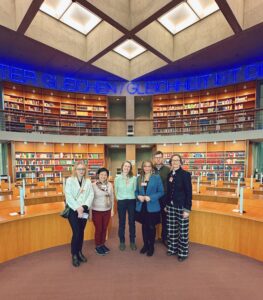 By Loida Garcia-Febo, MLAS Chair, IFLA Governing Board Member
By Loida Garcia-Febo, MLAS Chair, IFLA Governing Board Member
The IFLA Management of Library Associations is closely aligned with the broader goal of empowering communities in terms of MLAS’ core mission to strengthen libraries and their role within society.
On one hand, MLAS and its various activities including the Advocacy Impact Evaluation Project and the Building Strong Library Associations initiative including events with national library associations, webinars featuring needs of regions, and a forthcoming mentoring pilot, aim to strengthen library associations. MLAS contributes by providing library associations with the tools, skills, and support necessary to become more effective, sustainable, and impactful in their regions. By improving the management and capacity of library associations, IFLA seeks to create a network of well-equipped associations that can advocate for libraries, engage with governments and stakeholders, and influence policies that support the library sector.
On the other hand, IFLA’s overarching goal of empowering communities focuses on ensuring that libraries are able to serve their local populations effectively, creating inclusive spaces for learning, cultural exchange, and access to information. Libraries are central hubs of knowledge, education, and support, and empowering them strengthens their ability to meet the needs of the communities they serve.
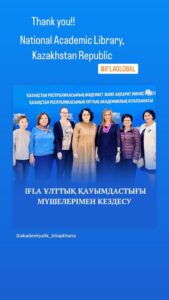 Therefore, MLAS is fostering capacity building for advocacy, collaboration and networking, and sustainable libraries for community empowerment.
Therefore, MLAS is fostering capacity building for advocacy, collaboration and networking, and sustainable libraries for community empowerment.
- Capacity Building for Advocacy: By strengthening library associations, MLAS directly empowers these associations to advocate for libraries on behalf of the communities they serve. Stronger associations can work more effectively to influence policy decisions that lead to better-funded, better-supported libraries, which in turn can enhance the services libraries provide to their communities.
- Collaboration and Networking: A strong library association fosters collaboration not only within the library community but also with external partners such as governments, schools, non-profit organizations, and other community stakeholders. This network enables libraries to be more responsive to community needs, ensuring that services like literacy programs, digital access, and cultural events are aligned with what communities require to thrive.
- Sustainable Libraries for Community Empowerment: A well-managed library association is more likely to have a lasting impact on the library sector, ensuring that libraries can continue their work over the long term. When library associations are empowered through better management practices, they create a ripple effect that strengthens libraries’ ability to support community development, whether through providing access to education, job skills, health resources, or social services.
In summary, the work of MLAS together with IFLA plays a pivotal role in empowering communities by contributing to ensure that libraries have the resources, management capacity, and advocacy power they need to fulfill their vital roles in society. This strengthening of library associations contributes to libraries’ ability to become community-driven, responsive spaces that meet the diverse and evolving needs of their populations. We look forward to collaborating with the big tent BSLA from IFLA in the immediate future.
Examples of MLAS Work
Advocacy Impact Evaluation Project: The aim of the Project is to strengthen the advocacy impact evaluation practice in the library field by providing a set of guidance and recommendations about how to measure and evaluate the library advocacy impact. The final project result, the Review of Advocacy Impact Evaluation Practices in the Library Field, is scheduled to be published by August 2025. For more information, monitor the following page for updates about the Project https://www.ifla.org/news/ifla-mlas-advocacy-impact-evaluation-project/
The 2024 MLAS Midterm in Kazakhstan was presented under the theme “Connect, Collaborate, Create: Advancing Library Associations and Partnerships to Future-proof our Profession.” The midterm was presented as part of Kazakhstan’s annual library conference, the 13th Eurasian Academic Libraries Conference (EALC), coordinated by The Nazarbayev University Library, in collaboration with IFLA Management of Library Associations and with the support of the Ministry of Science and Higher Education of the Republic of Kazakhstan and the Association of University Libraries in the Republic of Kazakhstan. LINK to event page: https://www.ifla.org/news/2024-mlas-midterm-in-kazakhstan/
The 2025 MLAS Midterm took place in Berlin from February 3-4, 2025. It was hosted by the German Library Association and by Volker Heller, Chair of the German Library Association and Director of the public library Zentral und Landesbibliothek Berlin, Berliner Stadbibliothek – and by and Hella Klauser, MLAS Member and International Officer for the German Library Association.
Events with library associations and other IFLA units
Library Associations:
Lebanon: IFLA’s Management of Library Associations (MLAS) Section collaborated with the Lebanese Library Association (LLA), the IFLA Middle East and North Africa (MENA) Regional Division, and the United Nations Economic and Social Commission for Western Asia (UN ESCWA) to present Libraries and the Digital Preservation of Cultural Heritage, 6th Conference of the Lebanese Library Association, taking place from 14-17 May 2024 in Beirut, Lebanon. MLAS Chair participated of the opening ceremony, and MLAS members together with other IFLA leaders presented two programs: IFLA and Cultural Heritage Preservation and IFLA MENA Advocacy and Sustainable Development Goals (SDG). Thanks to the Lebanon Library Association for the collaboration and MLAS Member, Dr. Imad Bachir for coordinating together with MLAS.
Croatia: The National and University Library in Zagreb hosted a very successful IFLA MLAS Advocacy Impact Evaluation Work Group Meeting in May 2024. The two-day hybrid meeting included a session titled “Library Advocacy: Measuring and Evaluating Impact” featuring the progress of the working group and speakers from different countries.
MLAS also collaborated with the Croatian Library Association to present a program titled “Building Strong Library Associations: strategic planning for success” during its annual conference last November 14, 2024. Thanks to the National and University Library and to the Croatian Library Association for hosting, and to MLAS Member, Dr. Dijana Machala for coordinating with MLAS.
Leshoto: IFLA MLAS Chair collaborated with the Lesotho Library Association, Unisa Library, and the IFLA -Sub-Saharan Regional Division to present a “Building Strong Library Association (BLSA) Planning Workshop for Lesotho Library Association: needs analysis” on August 26, 2024. Honored by the presence of Lesotho Minister of Information, Communications, Science, Technology, and Innovation.
Other IFLA units:
Mexican Information Global Forum (MEXINFO)
The forum addressed aspects of global relevance that affect the information environment, from traditional knowledge to artificial intelligence, having freedom of access to information and freedom of expression as one of its axes.
Within the framework of this Global Forum, five decades of collaboration between the library community of Latin America and the Caribbean and IFLA were celebrated under the title: “New trends in the information environment: 50 years of international cooperation with IFLA”.
Specifically, MLAS collaborated on: International Symposium on Libraries and Censorship “Unshelving Voices: Empowering Libraries Against Censorship”. (FAIFE, LGBTQ+ SIG, School Library Section, and Management of Library Associations (MLAS).
The event was hosted by the Institute of Library Information and Investigation (IIBI) of the Universidad Nacional Autónoma de México (UNAM), in collaboration with the Advisory Committee on Freedom of Access to Information and Freedom of Expression (FAIFE-IFLA).
IFLA New Professionals Special Interest Group (NPSIG)- MLAS sponsors this SIG and is very proud of the work they do to involve new professionals and LIS students in association’s work. Collaboration with the NPSIG is key to present MLAS successful webinars. They not only run the zoom system, but also actively contribute to script, design and conduct interactive conversations within the webinars that allow attendees to connect with peers and MLAS to compile needs and best practices from around the world.
Highlights of the NPSIG work include an annual IFLACamp before the WLIC bringing together new librarians from different regions of the world for insightful professional exchanges. The NPSIG also prolifically collaborates with many IFLA units including IFLA SET, CPDWL, Library Service to Multicultural Populations, Division C, etc. Stay updated
The IFLA Women, Information in Libraries Special interest Group (WILSIG): MLAS sponsors this SIG which was established more than 15 years ago. Their work has featured different topics such as women in tech and women empowerment. Currently MLAS is collaborating with them to present a webinar highlighting the SIG’s achievements and projects. The WILSIG has scheduled the publication of a newsletter with articles written by women in librarianship and a children’s booklist in collaboration with the IFLA Libraries for Children and Young Adults Section.
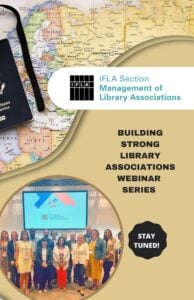 Webinars with IFLA Regional Divisions
Webinars with IFLA Regional Divisions
- Webinar with IFLA Europe Regional Division: November 28, 2024
- Webinar with IFLA North America Regional Division: April 29, 2025
- Webinar with IFLA MENA Regional Division: May 15, 2025
- Webinar with IFLA LAC Regional Division: June 20, 2025
- Webinar with IFLA A/O Division: July 8, 2025
- Webinar with IFLA Sub-Saharan Africa: July 16, 2025
Mentorship of Library Associations Pilot
Goal: Library associations to receive advice and support directly from other library associations by connecting them with mentor library associations according to needs. Pilot is set to start late in Spring 2025.
As we can see, through its dynamic initiatives and steadfast collaborations, IFLA MLAS continues to champion the essential role of library associations in fostering resilient, inclusive, and future-ready library ecosystems. By focusing on advocacy, strategic partnerships, and sustainable development, MLAS empowers associations to serve as catalysts for community transformation. Whether through capacity-building efforts, global conferences, or innovative pilot programs, MLAS reaffirms its commitment to the growth and vitality of libraries worldwide. As we look ahead to new partnerships and the upcoming mentorship pilot, MLAS remains dedicated to building a united, well-resourced global library community—one that is ready to meet the evolving needs of society with strength, creativity, and purpose.
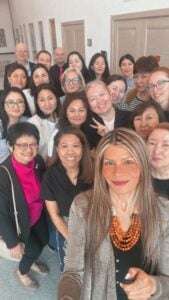 2024 Midterm in Astana
2024 Midterm in Astana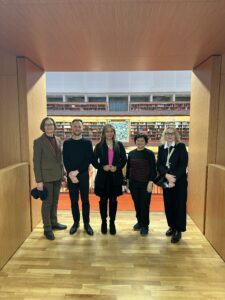 2025 Midterm in Berlin
2025 Midterm in Berlin